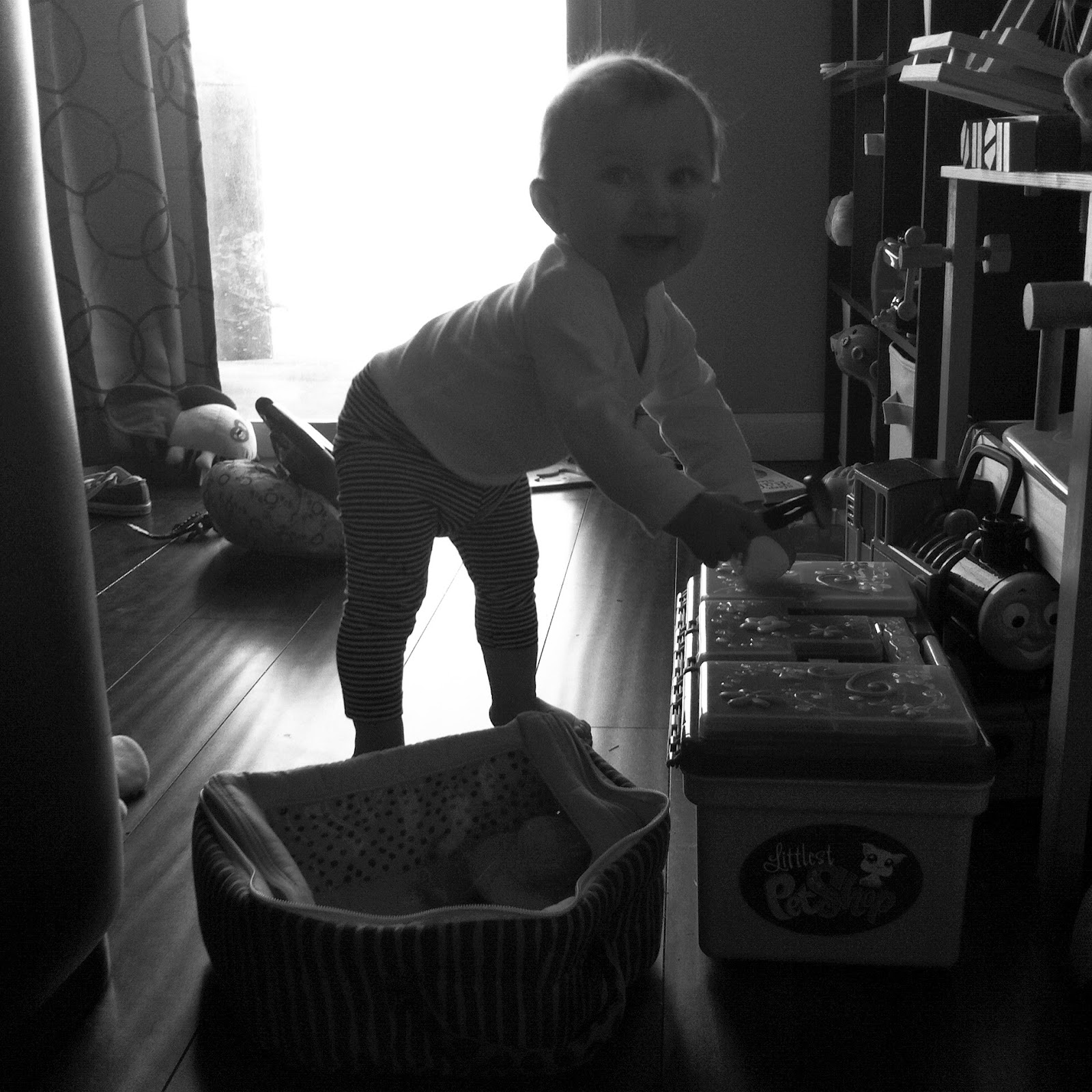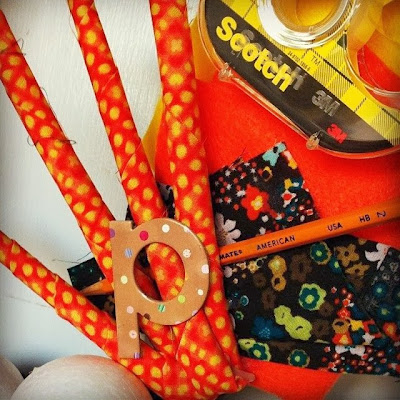While I pored over the second
galley proof of the literary magazine I edit with one of my nearest and dearest
colleague-friends and a too-strong cup of caramel coffee, I received the
following text from my husband: “Evangeline just took her first step!” He and our
three kids had been at Grammy’s house for the afternoon while I slipped away
during naptime to take care of some emergency editing (there is actually such a
thing, and it, as you might guess, falls squarely and surely under the heading
of “first world problems”).
I’d just gotten settled into an
empty house by clearing the dining room table, adorned with half a bouquet of
flowers I’d stolen from my mother-in-law after she’d performed a flirty
flapper’s rendition of “Button Up Your Overcoat” at a continuing education
showcase program and asked me to put them in water for a while since I’d be
going straight home.
I’d even prepared my apology in
advance for the rest of the house. It’s briefer than ever these days: “You’ll
have to forgive the house with the exception of this dining room table. I’m not
gifted in housekeeping.” I sometimes work in the word “knack.” I find it
charming and use it in hopes that it distracts from the dust. The idea that
people dust and vacuum weekly really is so foreign to me. I applaud those of
you who do it, and I’ll work the word aplomb
into my language massage if it makes you forgive me for the dirt and dog-hair
tumbleweeds lining the hallway in the meantime.
E apologizes sometimes. This is her
right after she ripped a page from one of my books. Is it just me, or do her
eyebrows slightly raise as if to say, “You know I’m only eight months old,
right? You didn’t think I was just going to turn the page like an Oxford grad,
did you?” She has a gift for the “shame on you” look. If she chooses motherhood
someday, she’ll be brilliant at it. I could learn so much from this little (n.).
And this little, this eight-month, nearly nine-month wonder, walks as if it’s a brief wish in a line of longer, loftier ones. My son was dragging his legs military-crawl-style with two eager and determined elbows for months before pulling up. This is him.*
He didn’t walk until he was fourteen months old, so the text
was not only telling me our daughter had walked her first steps but also that
she was some kind of superhero. The papers should have been notified that
moment, actually. I’m not sure what I’m doing just putting it on a blog. This
is actual news. Someone with a camera not in their phone should have been on
call to photograph it.
My
colleague’s response, when I read the text, was one of regret, like “Oh, you
missed it!”
I shrugged it off, “Oh, she’s the
third. And she’ll never know.” We both agreed the story should go that I was
there, and it was amazing. No one needed to know anything but that.
But the more the missed first step
settles in, the more my heart goes in two directions. Half of me says that she
should get ready for me to miss many more things. It’s just not possible for me
to be two places at once, and I’m needed so many places at once sometimes. The
other half of me remembers winning a spelling bee, among many events, my dad
could not attend because of work, and knew that because it even came to mind,
it mattered much more than I wanted it to.
My son calls me out on it often. He
is nearly three, and he is incredibly bright. That fourteen-month-walking jig
was up really quick when we realized that was his giving us a head start
because he hasn’t stopped since. His brain doesn’t stop. Like my oldest, he is
intuitively wise. He knows that the front yard is no place for a laptop when
the weather is good, and we’ve got a bucket of sidewalk chalk calling our names.
I thought I was killing it as Mom
last week. Papers had to be graded; kids had to be raised. One beach chair on
the front walk later, and boom—WorkingMamaPalooza. Lies. All lies. He walks up,
presses a few keys, closes the laptop, and says, “No laptop, Mommy. You done.”
Smart kid.
I have enough Working Mother’s
Guilt for all of us, and I’m done being distracted with questions of semantics,
like why there isn’t anything like Working Father’s Guilt, or speculating about
the answers some churchly friends would say in response to my bringing up
Working Father’s Guilt—questions I get all the time anyway, like “Are you still
working?” and “Are you a liberal?”
Guilty or
not, I’ll say I feel being caught in the gap between books and babies some
days. I am fully present and all in with whatever’s in front of me, but some
days, it’s a revolving door. In the past
three weeks, we’ve had five sinus infections, an allergic reaction to
medication, four trips to the pediatrician, three trips to the pharmacy, two
days of missed work, a couple hundred dollars bet on recouping, and a thousand
loads of laundry. Seriously, it probably would have been easier to just move or
buy new children. But, we’re very nearly well, so things are looking up. This
was E before she broke out in hives. The calm before the storm really only
means a storm is coming. It’s nothing to relax or take a cocky selfie about.
Yet, here we are.
Sickness is
a monkey wrench thrown into the Swiss clock of our household constitution. We
cannot be sick. The whole thing goes to hell.
I’ve been
consumed lately with the notion of “breathing room,” or “adding margin to my
life,” but the trouble is I’ve been living with time credit cards, and the debt
piles up until we get sick, and it’s a feeling very similar to playing Level 10
in Tetris on no sleep while someone is kicking you in the face. I’ve been so
consumed with these notions that my study of breathing room, margin, and
recreational reading have begun eating into that margin that would have been
there, so I’m maxed out again.
When
someone shakes a pity noggin or points a finger of shame in my direction, I
want to tell them that it could be worse. I could be doing drugs. But honestly,
I’d never waste money or time on drugs while hummus and Downton Abbey still exist, and they’d call my bluff. Everyone knows
what I’m about: Jonathan and Jesus. Anything else is window dressing.
Still, how do I do it? I’ve never known how to explain it before, that
sense that I’m busy but managing just fine, that I’m tired but not broken, that
I’ll keep doing what I’m doing because I’m called to be here and there, that heavy hope that this is
okay and we are fine, but the words came today, as they always do.
I focus on the honey, not the hive.
*(It should be he,
not him, because it’s a subject
complement, but honestly, who’s doing that these days. If I would have put in he, half of you would have thought I
were wrong and roughly the other half would have thought I were pompous. It
would be only that sweet spot of 1% that championed me and my whole grammar
fight, and with my slack-jawed and mostly intentional word mangling [I call
them letter butterflies sometimes], I doubt you all read these things. Thanks
to those who hang in there despite me.)















